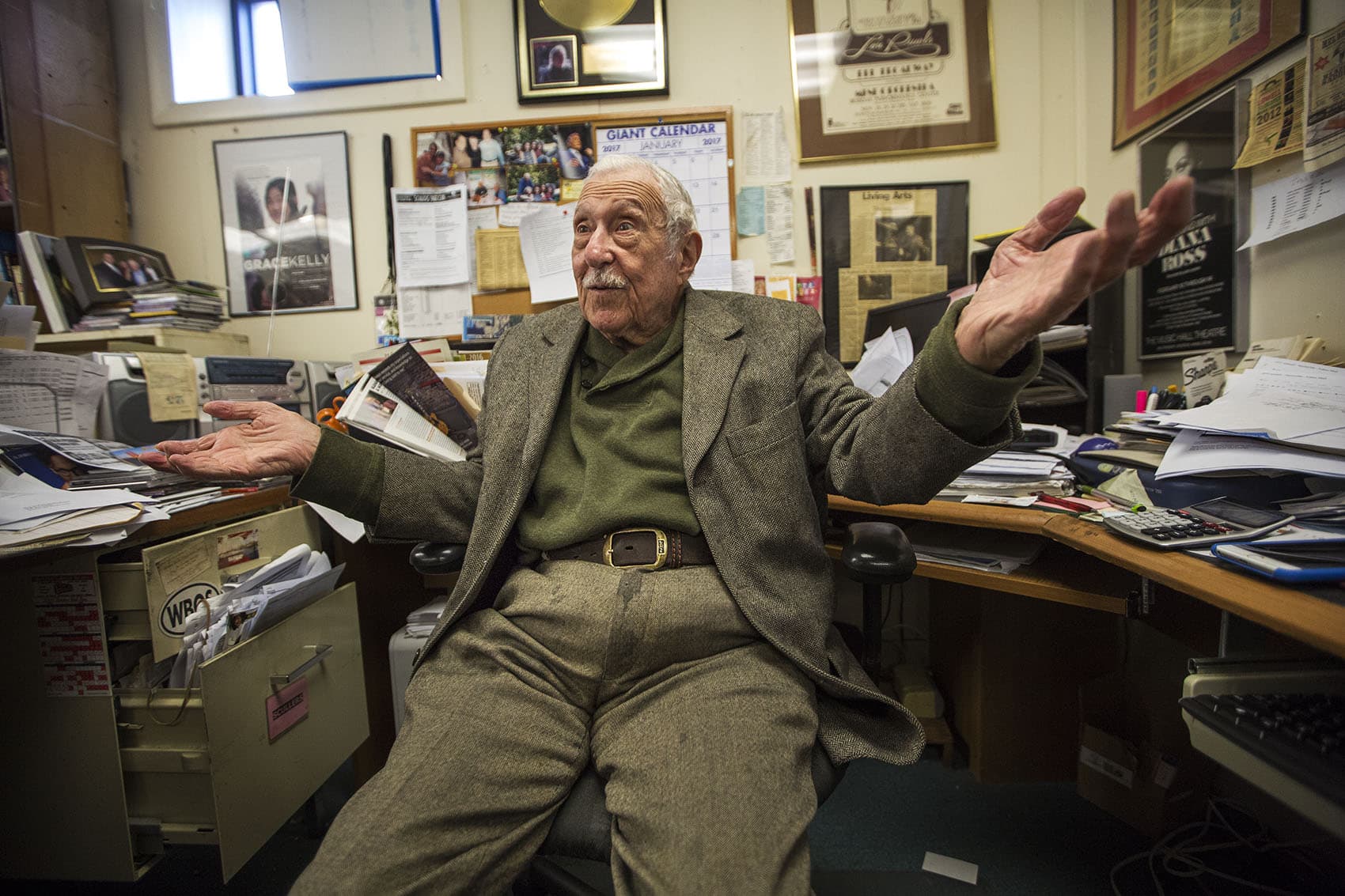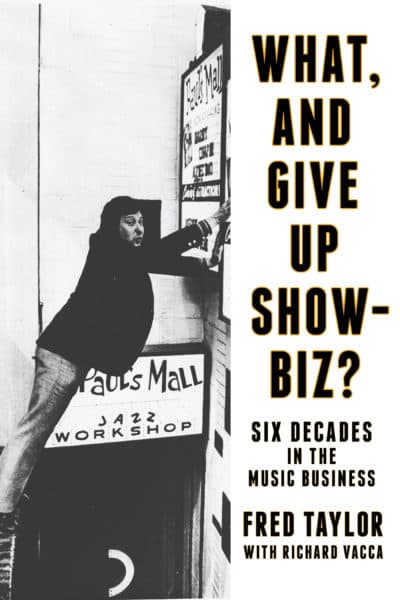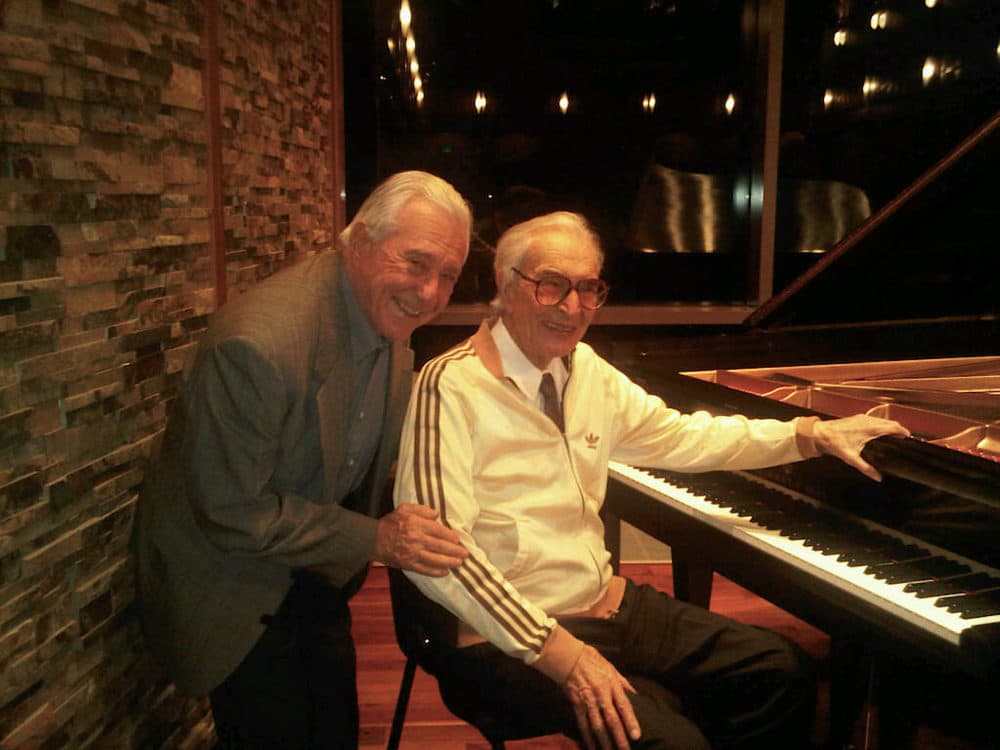Advertisement
In Posthumous Memoir, Jazz Impresario Fred Taylor Reflects On 60 Years In The Music Business

Fred Taylor could tell stories. Man, could he tell stories. And often, when the Boston-based jazz impresario really got going, his conversational partner would say, “Fred, why don’t you put these into a book?”
Which, after considerable time and effort, Taylor has done: “What, and Give Up Showbiz?: Six Decades in the Music Business” (out now). One problem is he won’t be around for the launch. Cancer claimed Taylor’s life last October, at 90.

Three years ago, Taylor was feted by hundreds of friends, famous and otherwise, at a Berklee Performance Center party-fundraiser, the inauguration of the All-Star Fred Taylor Scholarship. Before it began, I semi-joked that he had become a modern-day Tom Sawyer — hearing all the great stuff people would say at his own funeral. Taylor laughed, a bit ruefully, but admitted there was some truth in there, too.
Taylor’s first big break came from a rough tape recording he made of Dave Brubeck in 1952 and a friendship that lasted decades. That was the door-opener. Over the years, he booked some of the biggest names in jazz. Among them, Duke Ellington, Dizzy Gillespie, John Coltrane, Miles Davis, Stan Getz and Charles Mingus. By and large, these performers kept coming back to play for Taylor over the years.
“What, and Give Up Showbiz?” was co-written with Richard Vacca, a Boston jazz historian. The two began work more than three years ago and the result is definitely colloquial and mostly chronological. In fact, it was essentially Taylor reacting to questions posed by Vacca, with Vacca assembling the anecdotes and memories into chapters.
The title of the book comes from an old joke about a man whose job is to clean up elephant dung at the circus. When he complains about it and is asked why he doesn’t quit, he answers, “What, and give up showbiz?” It’s a refrain that runs through Taylor’s book.
Aside from his upbringing and early adventures, there’s very little about the personal side of Taylor’s life. He barely had one — or, put another way, he was a tireless promoter and his professional life was his personal life.

“What, and Give Up Showbiz?” is a very Boston-centric book. It’s where he was born and where he owned his famous Boylston Street clubs, Paul’s Mall and The Jazz Workshop, and where he served as entertainer coordinator at Scullers Jazz Club for a quarter-century until 2017. But Taylor booked and promoted shows at myriad venues, from Symphony Hall to Tanglewood to the Harvard Square Theatre (since closed). (Taylor and his partner leased and then owned the iconic movie theater/concert hall from 1976 to 1986 — The Clash played in Feb. 1979, though it was not their first U.S. gig, as Taylor writes.)
And if he was known for his jazz fanaticism — via his kinship with the musicians and relentless promotion and bookings — it’s clear Taylor had a nose for where the action was, from the Jazz Workshop/Paul’s Mall days onward. He booked early Bob Dylan, Bruce Springsteen, Aerosmith, Jimmy Buffet, Patti Smith, Bob Marley and the Wailers and Earth, Wind & Fire.
He also booked a ton of comedy acts in the 1960s and ‘70s comedy boom, from Henny Youngman and Mort Sahl to Flip Wilson, Joan Rivers, Lily Tomlin, George Carlin and Richard Pryor. He claimed his passion for comedy was equal to that of jazz and fancied himself a good amateur comic, never tiring of launching into the Carl Reiner and Mel Brooks routine, “The 2,000-Year-Old Man.” At Taylor’s 90th birthday party last year — at the home of friends Irene Chang and Bob Kelly (parents of saxophonist Grace Kelly) — Taylor did a set of “sit-down” comedy shtick. That is, he sat in a chair and retold a series of jokes from back in the day.
Advertisement
In fact, comedy is one of the main “reveals,” if you will. Those of us who knew Taylor in the late 20th century and first part of the 21st saw him as a jazz man, putting everyone from future stars like Chris Botti, Michael Bublé and Harry Connick Jr. to young discovery Grace Kelly in Scullers Jazz Club. The truth of his career was that Taylor was a one-stop, full-service entertainment entrepreneur. In that long game, he won some and he lost some. And when he lost — “What, and give up showbiz?”
This is as sweet-tempered a music biz tale as you’re likely to ever encounter. It’s not a book of big bangs, salacious zingers or sex and drugs. It’s Taylor’s journey through the ups, downs and turnarounds of his chosen profession. There’s no revenge, no score-settling or dirt-digging; even some of the musicians with notoriously bad habits are painted with light brush strokes. Taylor wasn’t happy Chuck Berry demanded to be paid in cash before his gig, which set Taylor on a mad dash around town, collecting dough from friends. Then again, that happened to virtually every promoter that booked Berry.
Taylor had his favorites and, artistically speaking, was something of a purist. The big band music he grew up on was what he loved most. But as a businessman and a realist, he had a keen sense for the market and writes that when jazz purists gave him grief for some of his smooth jazz bookings, he took it all in stride — you try and fill a club night after night.
Taylor was on copacetic terms with some of the most famously prickly performers in the business — from Miles Davis to Buddy Rich to Eartha Kitt to Nina Simone. Of his 20-plus year relationship with the mercurial Davis, Taylor writes, “He hit me and I hit him right back and he loved that.”
Also in the book are Taylor’s disappointments — when he took a beating in the stock market in 2008 and when the Boston Symphony Orchestra’s John Volpe severed his Jazz Café programming at Tanglewood the same year. He was stunned when, without warning, the last in a long line of Scullers’ managers cut him loose in 2017. But there was always a bounce-back of sorts. A second, third, fourth or fifth act.
“The key for me,” Taylor wrote, “was [Duke Ellington’s] comment that it’s okay to look back, but let’s think about what’s coming up. That has become part of my philosophy; that you gotta keep moving forward. It’s what’s next that’s important.”
Irene Chang says Taylor worked “on photo credits/licensing throughout the summer of 2019 despite his condition. He really hung in there to finish the book to meet the deadline at the end of September. It was really tough on him, but he was determined. At the end, nothing mattered more to Fred than finishing his book.”
A virtual celebration in honor of Fred Taylor will be held Dec. 7 at 8 p.m. with performances by Esperanza Spalding, Diana Krall, Grace Kelly and many others. The free online event will stream on YouTube and Facebook.


